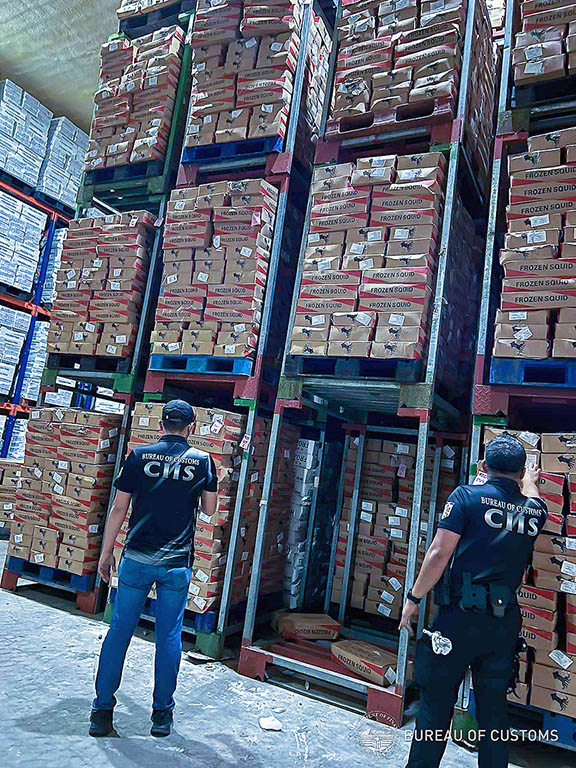
-
President Ferdinand Marcos, Jr. certified as urgent a measure defining the crime of agricultural economic sabotage and its penalties
-
Senate Bill No. 2432, to be known as Anti-Agricultural Economic Sabotage Act, is among the expanded legislative agenda identified by the Legislative Executive Development Advisory Council during its third meeting on September 20
-
SB 2432 will repeal Republic Act No. 10845 or the Anti-Agricultural Smuggling Act of 2016
The Anti-Agricultural Economic Sabotage Act has been certified as urgent by President Ferdinand Marcos, Jr.
Senate Bill (SB) No. 2432 defines the crime of agricultural economic sabotage and introduces stiff penalties for violators. It is among the expanded legislative agenda identified by the Legislative Executive Development Advisory Council during its third meeting on September 20.
The measure aims to repeal Republic Act No. 10845 (Anti-Agricultural Smuggling Act of 2016), which already declares large-scale agricultural smuggling as an act of economic sabotage.
SB 2432 aims to promote productivity of the agriculture sector, protect farmers and fisherfolk from unscrupulous traders and importers, and ensure reasonable and affordable prices of agricultural and fishery products for consumers.
RELATED READ: Senate measure tags smuggling, hoarding, profiteering as economic sabotage
Under the proposed measure, the crimes of agricultural smuggling, hoarding, profiteering, and cartel as economic sabotage are committed when the value of each agricultural and fishery product subject of the crime is at least P1 million.
In comparison with RA 10845, economic sabotage is defined as large-scale agricultural smuggling of at least P1 million worth of sugar, corn, pork, poultry, garlic, onion, carrot, fish, and cruciferous vegetables which are in their raw state or have undergone simple preparation or preservation for the market. For rice, the minimum amount to be considered as economic sabotage is P10 million, as valued by the Bureau of Customs.
Under SB 2432, large-scale smuggling is committed through importation of agricultural and fishery products without an import permit from the regulatory agencies; when the import permits are used by persons other than those specifically named in the permit; and when fake, fictitious, or fraudulent import permits or shipping documents are used.
Also covered in the regulation is the selling, lending, leasing, assigning, consenting or allowing the use of import clearance of corporations, non-government organizations, associations, cooperatives, partnerships, or single proprietorships by other persons.
Moreover, large-scale smuggling is carried out when entities misclassify, undervalue, or misdeclare in filing the import entry and revenue statement with the BOC in order to evade the payment of rightful taxes and duties due to the government; and when entities organize or use dummy corporations, NGOs, associations, cooperatives, or single proprietorships to acquire these import permits.
Transporting or storing of these agricultural products in whatever quantity, as well as acting as broker of the violating importer, is also considered a smuggling activity.
SB 2432 added in the coverage the use of a private port, fish port, fish landing site, resort, and/or airport to perpetuate economic sabotage.
Agricultural hoarding, meanwhile, is committed by undue accumulation and unreasonable refusal in the face of existing shortage of products, artificial or real, by a person or combination of persons to dispose of, sell or distribute such products to the general public.
Agricultural profiteering, on the other hand, is the sale or offering for sale of agricultural and fishery products at a price grossly in excess of their true worth, as indicated in the daily price index, in the face of existing shortage or emergency, artificial or real.
Cartel as a crime is committed by any combination of or agreement between two or more persons engaged in the production, manufacture, processing, storage, supply, distribution, marketing, sale or disposition of any agricultural and fishery products designed to artificially and unreasonably increase or manipulate its price, involving agricultural and fishery products.
Penalties
Under SB 243, the penalty of life imprisonment and a fine thrice the value of the agricultural and fishery products subject of the crime as economic sabotage will be imposed on any person who commits, or aids or abets the commission of, any of the prohibited acts under the proposed bill.
Any government officer or employee found to be an accomplice in the commission of the crime will “suffer the additional penalties of perpetual disqualification from holding public office, exercising the right to vote, from participating in any public election, and forfeiture of employment monetary and financial benefits,” the bill read.
When the offender is a juridical person, criminal liability will be attached to all officers who participated in the decision that led to the commission of the crime, with a penalty of perpetual absolute disqualification to engage in any business involving importation, transportation, storage and warehousing, and domestic trade of agricultural and fishery products.
Government authorities also has the right to confiscate the agricultural and fishery products which are subject of the prohibited acts and the properties used in the commission of the crime of agricultural economic sabotage such as, but not limited to, vehicles, vessels, aircrafts, storage areas, warehouses, boxes, cases, trunks, and other containers of whatever character used as receptacle of agricultural and fishery products.
A technical working group is finalizing the counterpart measure at the Lower House.
SB 2432 substitutes various bills and was prepared by the Committees on Agriculture, Food and Agrarian Reform, Justice and Human Rights, Finance, and Ways and Means with Senators Joseph Victor Ejercito, Manuel Lapid, Ramon Revilla, Jr., Cynthia Villar, Joel Villanueva, Risa Hontiveros, Robinhood Padilla, Raffy Tulfo, Ronald dela Rosa, and Imee Marcos as authors.




